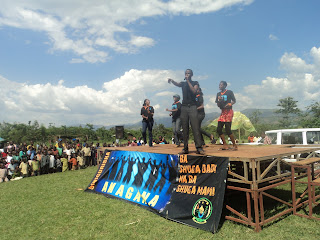Ingenzi Knit Union
On January 5th, RAPP representatives visited the Ingenzi Knit Union (IKU) at Village of Hope. The IKU is a cooperative union that currently consists of three Rwanda Knits-supported primary cooperatives. The three primary cooperatives are Mpore Mama, Hope, and Hosiana. Each cooperative aims to provide income generating activity through knitting to low-income and marginalized people, primarily women. By joining together into a union, the cooperatives have been able to increase production capacity and profits. As a union, the cooperatives are now able to handle larger orders from both local and international buyers.
During this visit the executive board of IKU was meeting with a representative from Indego Africa, an NGO that connects local artisans with international markets. IKU and Indego are in the process of building a partnership. The main purpose of this meeting was for Indego to get to know the union’s organization and business practices and to explain the benefits and expectations of a partnership. As a partner, Indego will help to provide and facilitate a curriculum of trainings and classes to cooperative members. These educational activities will help the cooperative members to increase productivity and their ability to run their business efficiently. The IKU members are excited for these trainings because they would like to be a completely self-sufficient business. Additional meetings have been scheduled to work through the details of the partnership.
Susuruka
On January 11, representatives of RAPP and the Ingenzi Knit Union (IKU) visited the Susuruka knitting cooperative in Nyamata. This cooperative has requested to join IKU. If Susuruka integrates into IKU, it will be the fourth primary cooperative. IKU hopes to increase to a total of six primary cooperatives by the end of 2011.
Today the Susuruka members were meeting with three members of the IKU executive board to discuss joining the union. First the president of IKU explained more about the union and its current primary cooperatives, as well as what requirements must be met to join the union. Then the leader of Susuruka gave some background information about the cooperative. The cooperative currently has 27 members, 37 machines that can be used for international orders, and 20 machines that can be used for local orders. Susuruka is partly supported by the Millennium Villages Project and works directly with its Business Development Office.
In order for integration to occur, IKU must vote on the matter at their General Assembly meeting on January 14th. If they vote to accept Susuruka as a primary cooperative, IKU will write an official letter of integration and Susuruka will pay the first installment of their capital share. Once these steps have been completed, Susuruka will become a full working member of the union. As of now, Susuruka appears to be a good fit in the union because they have helped with some of IKU’s larger projects in the past and are very skilled and dedicated workers.
